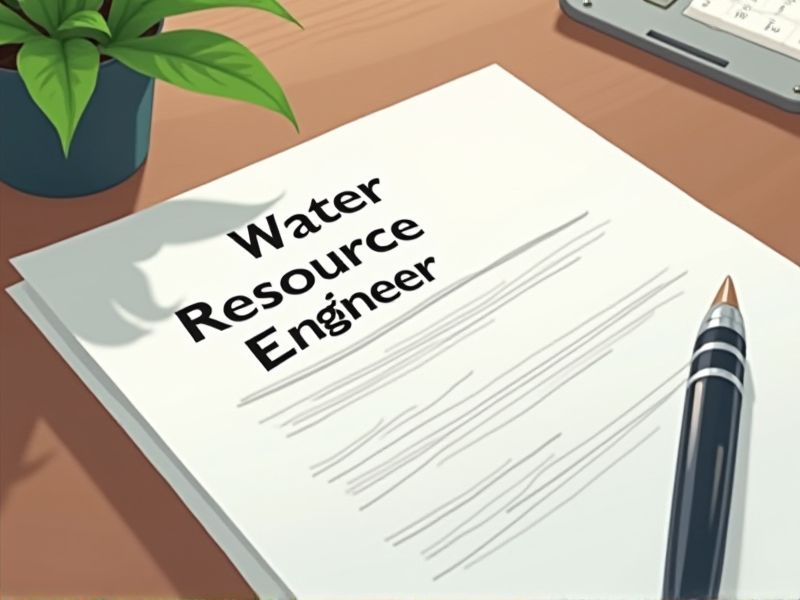
Water Resource Engineers play a pivotal role in designing and managing systems that ensure adequate water supply and quality. Obtaining specific certifications validates their expertise, ensuring compliance with industry standards and regulations. These credentials enhance an engineer's credibility and open pathways for career advancement. Essential certifications you may need for a Water Resource Engineer include the following.
Professional Engineer (PE) License (Civil/Environmental/Water Resources)
Obtaining a Professional Engineer (PE) license signifies that a water resource engineer has achieved a recognized standard in technical competence and ethical practice, essential in civil, environmental, and water resource project execution. Clients and employers often rely on the credibility of PEs, who must adhere to rigorous safety and regulatory guidelines, thus fostering trust in the engineer's ability to design and manage public water systems responsibly. The PE license is legally required to sign off on engineering plans, ensuring accountability in project approvals and compliance with industry standards and state laws. The credential enhances career prospects and earning potential, signaling dedication and expertise in sustainable water management solutions.
Certified Floodplain Manager (CFM)
A Certified Floodplain Manager (CFM) credential provides a Water Resource Engineer with specialized knowledge in managing floodplain areas effectively. This certification ensures that engineers are equipped to comply with federal and state regulations, reducing liability and enhancing project success rates. Implementing strategies developed by CFMs can lead to improved flood risk management and infrastructure resilience. Having a CFM also elevates an engineer's credibility, potentially leading to more project opportunities and career advancement.
LEED Accredited Professional (LEED AP)
Achieving LEED Accredited Professional (LEED AP) status equips a Water Resource Engineer with the expertise to design sustainable water management systems. The credential signifies a thorough understanding of environmental impact and sustainable practices, essential for planning projects that conserve water resources. LEED APs are recognized as leaders in sustainable design, increasing their value in multidisciplinary teams focused on eco-friendly construction. The credential also enhances a water engineer's ability to meet regulatory requirements and contribute to achieving LEED certification for projects, which is increasingly sought by clients.
Project Management Professional (PMP)
PMP certification equips water resource engineers with structured project management skills, enhancing their ability to oversee complex water infrastructure projects effectively. This certification can lead to improved risk management, reducing potential project delays and cost overruns commonly associated with large-scale water projects. PMP-trained engineers often demonstrate increased proficiency in stakeholder communication, which is crucial in navigating the multi-faceted interests present in water resource projects. Employers typically prefer or require PMP certification for engineering roles, recognizing its value in streamlining project execution and maintaining high standards of quality and efficiency.
Certified Stormwater Manager (CSM)
Certified Stormwater Manager (CSM) enhances a Water Resource Engineer's credibility and expertise in managing stormwater systems. Effective stormwater management requires specific knowledge of regulatory compliance and sustainability practices, which the CSM certification provides. Water Resource Engineers with CSM certification can better design and implement systems that mitigate flooding, prevent pollution, and promote groundwater recharge. Organizations often prefer hiring professionals with CSM due to their demonstrated competency in addressing complex stormwater challenges efficiently.
Certified Environmental Professional (CEP)
Certified Environmental Professionals (CEPs) possess in-depth knowledge of environmental regulations, essential for water resource engineers to ensure compliance in project planning and execution. Their expertise facilitates the development of sustainable water management strategies, minimizing environmental impact and conserving resources. As water projects often intersect with sensitive ecosystems, CEPs provide the necessary skills to assess and mitigate ecological risks effectively. In complex water resource projects, their certification enhances credibility and trust with stakeholders by demonstrating commitment to environmental stewardship.
AWWA Water Quality Operator Certification
The AWWA Water Quality Operator Certification ensures a water resource engineer is proficient in maintaining safe drinking water standards. It verifies the engineer's ability to operate and manage water treatment facilities effectively, reducing the risk of contamination. Certification equips engineers with up-to-date regulatory knowledge, which is vital as water regulations frequently evolve. The credential boosts professional credibility, potentially leading to career advancement and increased trust from employers and the public.
Certified Water Efficiency Practitioner (CWEP)
A Certified Water Efficiency Practitioner (CWEP) enhances the proficiency of a Water Resource Engineer by providing specialized skills in identifying and implementing water conservation measures. The expertise of a CWEP in efficient water management directly influences the sustainability of water resources projects. Utilizing techniques learned through CWEP certification can result in substantial cost savings in water infrastructure projects. By merging CWEP knowledge with engineering principles, Water Resource Engineers can better address regulatory and environmental challenges related to water usage.
Watershed Management Professional Certification (WMPC)
Water Resource Engineers require the Watershed Management Professional Certification (WMPC) to enhance their expertise in sustainable water practices, given the increasing complexities of watershed ecosystems. Certification provides engineers with the latest methodologies for mitigating flooding and managing water quality, which are vital in designing effective watershed projects. WMPC equips professionals with advanced tools for evaluating watershed-related risks, directly impacting their capability to develop resilient infrastructure. As environmental regulations become more stringent, this certification ensures engineers meet current compliance standards and industry best practices.
Flood Risk Management Certification (FRMC)
Flood Risk Management Certification (FRMC) is essential for water resource engineers as it equips them with specialized knowledge to effectively assess and mitigate flood risks. Lack of understanding of advanced flood management techniques can lead to ineffective infrastructure design and increased vulnerability to flooding events. With climate change increasing the frequency and severity of floods, engineers need up-to-date expertise to integrate sustainable practices into their designs. Employers and clients often seek certified professionals, as certification demonstrates a commitment to maintaining high industry standards in flood risk management.
Summary
When you obtain additional certifications as a Water Resource Engineer, your expertise and credibility in the field increase significantly. This enhancement often leads to better job prospects and potential salary increments. Organizations tend to entrust certified engineers with more complex projects, enhancing your career development. The certifications also keep you updated with the latest industry practices and technologies.
